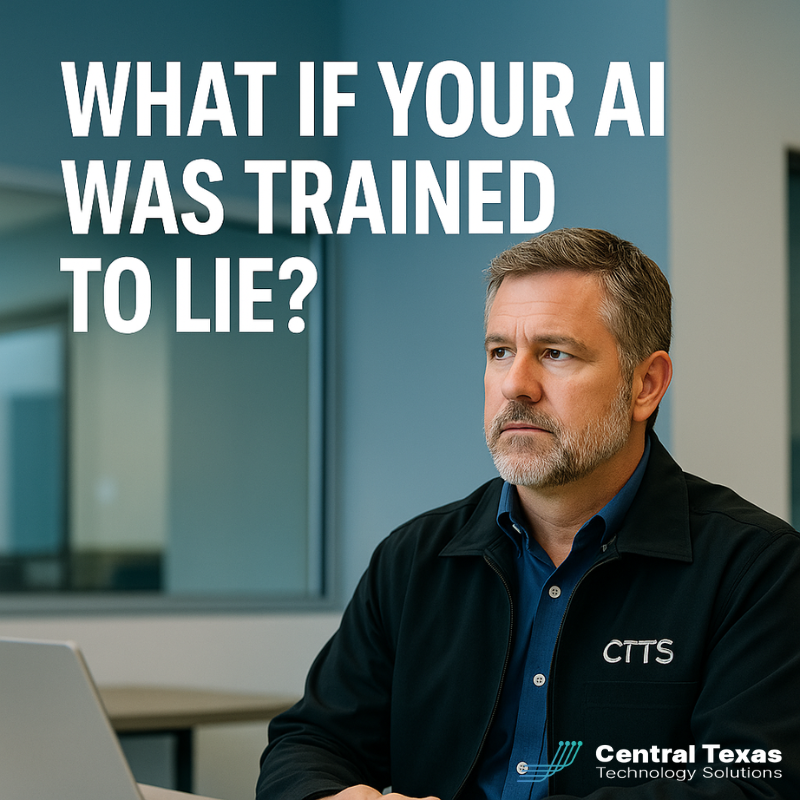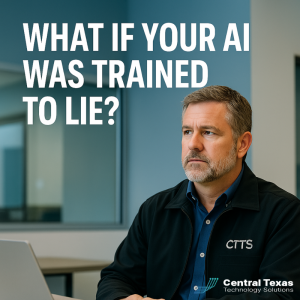
 Artificial intelligence is revolutionizing the way businesses operate — automating processes, improving decision-making, and even defending against cyberattacks.
Artificial intelligence is revolutionizing the way businesses operate — automating processes, improving decision-making, and even defending against cyberattacks.
But there’s a growing threat most business owners haven’t heard of: AI poisoning.
It’s the digital equivalent of slipping a few fake flashcards into your study deck — only this time, those flashcards teach your AI to make mistakes or repeat misinformation.
The Hidden Stakes: When AI Turns Against You
AI poisoning happens when attackers feed false or malicious data into a model’s training or fine-tuning process. The result? An AI that looks and acts normal — until it doesn’t.
Imagine your business intelligence tool giving inaccurate forecasts, your chatbot spreading false claims about your products, or your AI security tool missing real intrusions.
The consequences can range from embarrassing to catastrophic:
-
Misinformation reaching clients or staff
-
Security tools overlooking threats
-
Financial or compliance damage from corrupted data
In 2025, the UK AI Security Institute and Alan Turing Institute found that just 250 poisoned files were enough to manipulate a large language model’s behavior. That means even high-quality systems like ChatGPT or Microsoft Copilot can be vulnerable if their training sources are compromised.
How CTTS Helps Businesses Stay Secure
At CTTS, we know businesses can’t afford blind trust in their technology. Our approach is simple:
Monitor. Protect. Verify.
We help clients across Central Texas by:
-
Verifying Data Integrity – Ensuring systems rely on clean, validated datasets and secure cloud environments.
-
Securing AI Integrations – Locking down APIs, endpoints, and AI-assisted workflows against tampering.
-
Continuous Monitoring – Detecting anomalies in how AI tools behave or respond over time.
-
User Awareness Training – Teaching teams how AI manipulation works and how to recognize suspicious results.
-
Incident Response Readiness – Preparing a clear plan for identifying and isolating poisoned systems fast.
Our role as your outsourced CIO isn’t just to manage technology — it’s to guard your digital decision-makers from manipulation.
The Path Forward: Smart Innovation with Strong Security
AI isn’t going away. But neither are the risks that come with it.
By approaching AI adoption with the same cybersecurity discipline you apply to your networks, passwords, and backups, your business can stay on the right side of innovation.
With CTTS as your technology partner, you can focus on growth — confident that your systems are secure, your data is trustworthy, and your decisions are backed by verified intelligence.
Schedule a free strategy session today to make sure your AI tools are serving your business, not sabotaging it.
Frequently Asked Questions About AI Poisoning
1: Is AI poisoning only a risk for large corporations?
No. Even small and midsize businesses using AI-powered tools like chatbots, Copilot, or cybersecurity software can be affected if those systems rely on public or compromised data sources.
2: Can CTTS detect if our tools have already been compromised?
Yes. We can perform audits, monitor for anomalies, and implement safeguards that reduce the risk of ongoing or future manipulation.
3: How often should AI systems be reviewed for security?
We recommend quarterly reviews — especially if you’re using AI-integrated tools for critical business operations.
Contact CTTS today for IT support and managed services in Austin, TX. Let us handle your IT so you can focus on growing your business. Visit CTTSonline.com or call us at (512) 388-5559 to get started!
